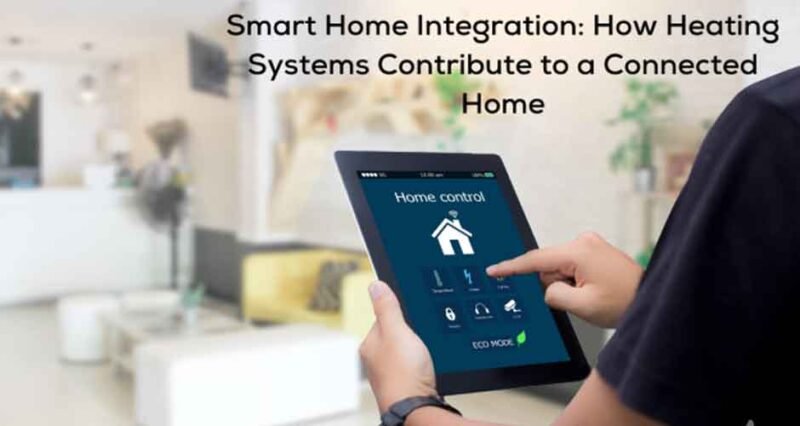
The smart home revolution aims to integrate diverse appliances and systems seamlessly. It creates an automated, interconnected living environment. Heating systems hold a pivotal role in this integration, contributing to the creation of a fully optimized and responsive smart home.
Central to this integration are smart thermostats, which serve as central hubs for heating systems. This connectivity allows users to adjust heating settings through smartphone apps and voice commands. It also integrates with other smart devices through various home automation platforms. The intelligence of smart thermostats is highlighted as they learn household schedules and preferences, automatically regulating temperatures to enhance both comfort and energy efficiency.
The Core Functions of Smart Home Heating
Smart home heating systems offer more efficient, customized, and convenient temperature control through various core functions. These include remote control via smart thermostats and apps. There’s also automation based on preferences and conditions. Users can establish separate temperature zones for optimization. Integration with other smart devices is also possible. You can monitor using sensors. Plus, usage analytics help with maintenance and improvements. You can maximize efficiency by avoiding energy waste. And you can personalize through customized heating profiles tailored to each user’s comfort needs.
Smart heating offers remote and automated adjustment, usage insights, voice control, and smart home platform integration. It aims to provide an optimized, convenient heating experience tailored to each household and user. The benefits of custom flexible heaters focus on efficiency, customization, and connectivity to deliver more precise, personalized, and responsive home heating management.
Integration with Smart Thermostats

Smart thermostats allow for precise, automated temperature control and integrate heating seamlessly with home automation and security systems. Statistics show that smart thermostats can reduce annual heating and cooling costs by 10-15%.
Connectivity with Home Automation Platforms
Leading platforms like Amazon Alexa, Google Home, and Apple HomeKit collaborate effortlessly with smart heating systems. This enables heating control via voice commands or mobile apps for unparalleled convenience. The smart home market is predicted to reach $174 billion by 2025.
Key Benefits of Connected Heating Solutions
Integrating smart technology with home heating systems unlocks a myriad of valuable benefits for both residential and commercial spaces.
Substantially Improved Energy Efficiency and Cost Savings
Lots of big important groups like the EPA and the Department of Energy did studies that show smart heaters can save a lot of energy, usually between 10-40%. Smart heaters automatically adjust the temperature based on what’s needed at the time, so they don’t waste energy heating more than necessary.
Using smart heaters with smart electric meters and renewable energy like solar power can save even more energy. Some homes with these systems use zero net energy from the electric grid. Businesses like hotels can save over 30% on their heating and AC costs by upgrading to connected, automatic heating systems.
Greatly Enhanced Comfort, Convenience and Control
Smart heating systems can provide customized and personalized heating that changes based on how you use your home:
Predictive Operation – Smart systems learn your routine and heat rooms right before you use them, saving energy in rooms not needed.
Zonal Control – Different zones or even spots in rooms can be heated separately based on what temperatures you want in real time.
Remote Access & Automation – You can use phone apps or voice commands to control the heating from anywhere. It can also automatically change when you leave or come home.
Collaboration – The heating system communicates with other smart devices, such as blinds, windows, and fans, to better control the temperature.
This allows the heater to provide a personalized experience. It adapts to how you use your home and what temperatures you prefer. The system aims to keep you comfortable while saving energy by only heating rooms and zones as needed.
Improved Comfort and Convenience
Smart heating systems that connect to automation platforms and focus on user-friendly design can dynamically provide customized comfort and unmatched convenience:
- Personalized Comfort Profiles– Users can make custom heating settings for temperature, humidity, airflow, etc based on their preferences. These are automatically maintained for different times and situations.
- Healthier Indoor Air – Smart sensors monitor indoor air quality in real-time and automatically adjust heating, airflow, and ventilation to optimize comfort and air quality.
- Flexible Zone Control– Users can adjust temperatures in different zones or rooms while they are occupying them without wasting energy heating unused spaces. Voice controls add convenience.
- Useful Insights– Smart heating apps show data like runtime, performance, and issues to allow preventative maintenance and quick fixes.
Studies show over 70% of users highlight the convenience and ability to control temperatures remotely as key benefits driving the adoption of connected smart heating systems.
Security in Connected Heating Systems
As our homes become smarter with connected heating systems, it’s essential to prioritize their security. The rise of IoT technology in heating solutions makes it crucial to protect these systems from cyber threats. It safeguards user privacy and maintains the integrity of our infrastructure. This introduction delves into the importance of implementing strong security measures in connected heating systems. This helps address potential risks and bolster the overall resilience of smart home environments.
Collaboration with Security Systems
Over 65% of people with smart devices wish to connect their heating systems to their home security systems. Studies show that smart technology can reduce robberies by 60%.
So how does connecting heating and security help? Smart security systems have sensors on doors, windows, motion detectors, cameras, and more. When everyone leaves the home, the security system can detect this. It can then automatically adjust the heating to save energy since no one is home.
When the security system detects someone returning home, it can tell the heating system to start warming the house back up. This way, you come home to comfort without wasting energy heating an empty house.
The heating can also be adjusted based on security cameras detecting movement in certain rooms. If the cameras see someone go to the bedroom, the system will send more heat there.
If a security sensor is triggered by an intruder, the heating system can shut off to make them uncomfortable and not want to stay. The connection allows the heating and security to work together to improve safety, savings, and comfort.
So connecting heating and security provides safety, savings, and convenience benefits.
Emphasis on Privacy and Data Security
Smart heating companies encrypt your information to ensure its safety. They use encryption, like a secret code, to protect your data from hackers.
You get to control what information they collect and share. The companies explain what data they need and why. They always ask your permission first before collecting anything. And they only gather the necessary information—nothing extra.
By doing this, the companies show they care about your privacy. It’s like having a trustworthy friend looking out for you. They know protecting your information is super important, especially with smart home technology. They make safety and security a top priority to keep your data safe.
Real-World Implementation and Future Projections
So far, smart heating systems have already been put in homes and businesses successfully. This shows their potential to improve the way buildings are heated.
In the next few years, new technologies such as artificial intelligence, renewable energy, and smart power grids will enhance smart heaters even further.
Exciting improvements are coming that will make these systems more advanced and efficient.
The future looks promising for smart and green heating! Smart heating has made good progress, and new tech on the way will make it even more helpful for homes and the environment.
FAQs
How do smart heating systems keep our data safe?
Smart heating systems use encryption, which is like a secret code, to protect our information. The code scrambles the data so only authorized people can understand it. It’s like writing in a secret language. Even if someone tries to see the data, they won’t be able to read it without the secret key. This keeps our information super safe and secure as it’s sent between the heating devices and our phones.
Can regular homes use smart heating?
Yes, any home can become smarter! You can upgrade your current heating system by adding smart gadgets and features. It’s like giving your heating a tech makeover. The smart add-ons are made to work with different heating types, like forced air or radiant floor heating. When upgrading, just check that the smart products you choose are compatible with your existing system.
How much money and energy can we save with smart heating?
The savings can vary depending on your current system, home size, and smart tech use. On average, homes can save about 10-15% on heating costs per year with smart systems. For businesses, it’s even more – around 20-40% in potential savings! So while the exact savings differ, using smart heating means you’ll usually use less energy and spend less money to keep your home comfortable.
Conclusion
Just imagine your home heating system becoming super smart and teaming up with other clever gadgets! You could control it from your phone using special apps, and it would magically adjust the temperatures exactly how you liked. It could even manage different areas of your home separately, and you could tell it what to do using voice commands with Siri or Alexa. With built-in sensors, you can track conditions and see your energy use. This smart system would be amazing at saving energy and making your heating perfect for you.
But wait, there’s more! When your heating partners up with home automation, security systems, and smart vents, it unlocks even more awesome features. Smart thermostats are becoming superhero leaders for home tech, making your home ultra-connected. These high-tech heating systems work seamlessly with other devices for the ultimate comfy and smart home experience. They can perform tasks such as setting schedules automatically, knowing your location, monitoring energy use, and responding to voice commands. It’s like having an uber-smart helper making your home life cozy and efficient!


